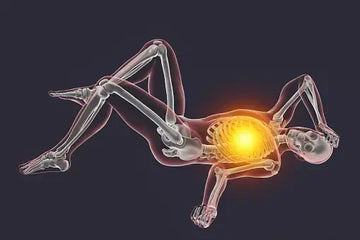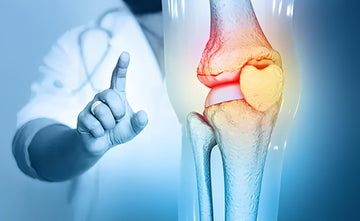

Importance of Magnesium for Women's Health
Table of Contents
Magnesium is a mineral that's really important for women's health, but a lot of people don't pay much attention to it. It's actually super important because it helps with a bunch of different reactions in our bodies. There are over 300 enzymes in our bodies that need magnesium to work properly.
For women, magnesium is especially crucial because it helps with things like keeping our bones strong, preventing heart disease, and keeping our minds feeling good.
Having enough magnesium in our bodies is really important for women because it helps our bones grow and stay strong.
Magnesium is like a helper for the cells that build our bones. Studies have even shown that people who get more magnesium in their diets tend to have stronger bones.
In this blog, we're going to dive deeper into why magnesium for women’s health is so important for women's health. We'll talk about how it helps with bone strength, heart health, mental well-being, and other important parts of staying healthy as a woman. Plus, we'll share some tips on where to find magnesium in food and give you some yummy recipes to try. And don't worry, we'll also answer some common questions about magnesium and make sure you know about any potential side effects.
Understanding Magnesium For Women's Health
Magnesium is super important for women because it helps with a bunch of stuff our bodies need to do. It's involved in more than 300 different reactions in our bodies, like making energy, building proteins, and keeping our DNA in good shape. Plus, it helps keep our blood sugar levels steady, controls our blood pressure, and makes sure our muscles and nerves work like they should.
The problem is, a lot of women don't get enough magnesium in their diets. This can happen because we're not eating enough foods with magnesium, our bodies aren't absorbing it well, or we're losing too much of it through sweat, pee, or certain medications we might be taking. When we don't have enough magnesium, it can mess with our health and cause all sorts of problems.

Key Benefits of Magnesium for Women's Health
#1: Enhancing Bone Density and Fighting Osteoporosis
While we often hear a lot about calcium and vitamin D being important for keeping our bones strong, there's also some evidence suggesting that not getting enough magnesium could put us at risk for osteoporosis, especially after menopause.
Research published in the journal Nutrients explains that magnesium deficiency might make osteoporosis more likely. It does this by messing with how crystals form in our bones and how our bone cells work. Plus, it can mess with a hormone called parathyroid hormone, which helps keep our bones healthy. On top of all that, not having enough magnesium might also cause some low-grade inflammation, which isn't good for our bones either.
To support bone health, women should ensure an adequate intake of magnesium through a balanced diet rich in magnesium-rich foods like leafy greens, whole grains, nuts, and seeds. It's also important to maintain sufficient levels of vitamin D through sun exposure or supplementation, as vitamin D deficiency can impact the body's ability to utilize magnesium for women’s health and their bone health.
#2: Reducing Premenstrual Syndrome (PMS) Symptoms
Premenstrual syndrome (PMS) is a common condition that affects many women. It is characterized by a range of physical and emotional symptoms that occur in the days or weeks leading up to menstruation. Magnesium supplementation may help reduce the severity of PMS symptoms and improve overall well-being during this time.
A study where neither the participants nor the researchers knew who was getting what found that magnesium could really help with those pesky premenstrual syndrome (PMS) symptoms, like mood swings. And here's another cool thing: looking at a bunch of different studies, experts found that taking magnesium along with vitamin B6 might be even better for tackling PMS than just taking magnesium by itself.
#3: Supporting Pregnancy and Lactation
If you're pregnant and dealing with those pesky leg cramps, you're definitely not alone. It's actually one of the most common complaints during pregnancy, according to the Mayo Clinic . They also say that not getting enough magnesium, potassium, or calcium in your diet can make those leg cramps worse.
But here's the thing: just because you might be lacking in magnesium doesn't mean taking more of it will automatically solve the problem. A review of 11 different studies published in the Journal of Musculoskeletal and Neuronal Interactions found that taking magnesium supplements didn't make much of a difference in pregnancy-related leg cramps compared to not taking them.
#4: Magnesium May Relieve Migraines
Did you know that women are more likely to get migraine attacks compared to men? It's true! And here's something interesting: people who suffer from migraines might have lower levels of magnesium in their bodies than those who don't.
But here's some good news: a bunch of studies have found that taking magnesium supplements might help reduce how often you get migraines. The American Migraine Association even talks about how magnesium could help prevent migraines.
Here's the thing though: not all magnesium supplements are the same. Some might work better for migraines than others. Research published in the journal Nutrients says that different forms of magnesium can have different levels of effectiveness for preventing migraines. So, it's a good idea to chat with your doctor about using magnesium to help with your migraines, and they can help you figure out which form might work best for you.
#5: Magnesium Regulates Blood Pressure
Did you know that more than 44% of women in the U.S. have high blood pressure ? That's a lot! If you're one of them, your doctor might talk to you about taking medication to help lower your blood pressure. But here's something interesting: magnesium could actually help naturally regulate high blood pressure.
This powerful mineral does some cool stuff in your body, like making your blood vessels wider and stopping spasms in your heart and blood vessel walls. A review of studies in the Journal of Clinical Hypertension found that taking between 500 mg to 1000 mg of magnesium every day could lower blood pressure by as much as 5.6/2.8 mm Hg.
Best Dietary Sources of Magnesium
A balanced diet that includes magnesium-rich foods is the best way to ensure an adequate intake of this essential mineral. Here are some of the best dietary sources of magnesium:
- Chia seeds: These tiny seeds are packed with magnesium and can be easily added to smoothies, yogurt, or oatmeal.
- Leafy greens: Spinach, kale, and Swiss chard are excellent sources of magnesium, and they can be enjoyed in salads, stir-fries, or smoothies.
- Nuts and seeds: Almonds, cashews, pumpkin seeds, and sesame seeds are all rich in magnesium and make for nutritious snacks.
- Legumes: Beans, lentils, and chickpeas are not only a good source of plant-based protein but also provide magnesium.
- Whole grains: Whole wheat, brown rice, and quinoa are all magnesium-rich options that can be incorporated into meals.
By incorporating these foods into your diet, you can ensure a sufficient intake of magnesium to support your overall health and well-being.
Magnesium-Rich Supplement to Include in Your Diet
Empower your well-being with Infinite Labs Liposomal Magnesium. This innovative formula delivers highly absorbable magnesium, targeting specific needs of women's health. Whether you crave more energy, seek hormonal balance, or want stronger bones, Infinite Labs Liposomal Magnesium might be the key. Experience the difference and take charge of your health today!
Can Excessive Magnesium Intake Be Harmful?
While magnesium is essential for women's health, it's important to avoid excessive intake. High doses of magnesium supplements can cause side effects such as diarrhea, nausea, and cramping. Individuals with kidney disease should be cautious with magnesium supplementation and consult with a healthcare professional.
Let’s Sum Up
To sum it up, after knowing the importance of magnesium for women’s health, you can choose your diet accordingly. It does a lot of good stuff, like making your bones stronger and helping out during pregnancy and breastfeeding. Adding foods that are rich in magnesium to your meals can really make a big difference in how you feel overall.
So, if you want to feel better and be healthier, think about adding more magnesium-rich foods to what you eat and trying out some recipes that have lots of magnesium in them. Just remember, it's important to have a balanced diet, so keep an eye on how much magnesium you're getting. Making magnesium a priority in your diet can help you stay healthy in the long run and support you on your journey to feeling your best.

















